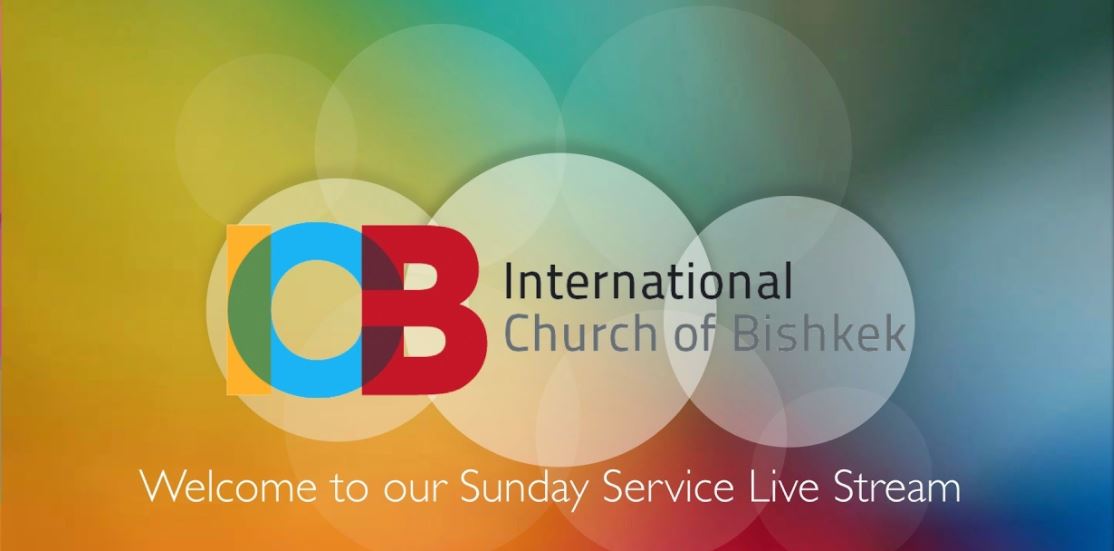|
photo by Laura Evans Before your very eyes Jesus Christ was clearly portrayed as crucified…. God give[s] you his Spirit by your believing what you heard. Galatians 3:1, 5 NIV Dear ICB family,
Here Paul says that the crucifixion of Jesus Christ had been depicted or shown to the Galatians "before [their] very eyes," yet they lived over a thousand kilometers away from Jerusalem, where Jesus was crucified. So how could Paul make such a statement? He didn't show the Galatians video clips or pictures of the crucified Christ. I doubt he used any visual aids whatsoever when he visited them. So in what way had they seen Jesus Christ as crucified? They had seen a clear portrayal of Jesus Christ as crucified not with physical eyes but, interestingly enough, with their ears. That is, on Paul's lips they heard the Spirit-empowered proclamation of the news of Jesus' death, and that proclamation was enough for Paul to say that Jesus had been put on display to them as crucified. Of course, Jesus could have been born, lived, and died during a time in history in which such events could have been video recorded and preserved for all of us to see with our own eyes. However, for his own inscrutable purposes, God decided that the way that we would see with our very eyes Jesus as crucified would be through our ears. We would need to be told it. And we would need to be told not merely what happened but also why it happened, which is exactly what Pastor Neil said: "Our eyes see what happened, but our ears hear the interpretation and give what we have seen meaning. With our eyes we can consider the heavens which declare the glory of God, but with our ears we can listen to the word of God that tells us who made those heavens" (my paraphrase from his sermon on June 27). And we could add in this case, "Our eyes could have seen the physical body of Jesus on the cross, dying in shame and agony, but with our ears we hear the words of Peter explain what this terrible, glorious spectacle was all about: 'Christ also suffered once for sins, the righteous for the unrighteous, that he might bring us to God' (1 Peter 3:18)." So take heart. By your simple words people will see Jesus as crucified. So open your mouth with great boldness and expectation, and beg God that people would hear and believe and receive God's gracious Spirit. Longing for the loud and clear proclamation of our only hope, Eric
0 Comments
Click on the image above to watch the service on our YouTube channel. Galatians 3:1-14; genesis 15:1-6v. 1: The Galatians had been "bewitched." It was as if someone had cast a spell on them so that their minds were confused and befuddled, and they couldn't think clearly. They had been distracted from the Jesus who had been publicly portrayed as crucified.
vv. 2-7: Before the Galatians had been bewitched, they had believed what they had heard. Here Paul moves from eyes to ears. Our eyes see what happened, but our ears hear the interpretation and give meaning to what we have seen. With our eyes we can consider the heavens, which declare the glory of God, but with our ears we can listen to the word of God that tells us who made those heavens. Verse 5 says that God supplies the Spirit "by hearing with faith." Abraham is an example of someone who heard the promise of God with his ears, he believed it, and God counted Abraham's faith as righteousness (Genesis 15:3). vv. 8-13: God is in the business of blessing. The outcome of Abraham's faith in God's promises was that Abraham was blessed and through him all the nations were blessed. We receive the blessing of entering into a right relationship with God not by keeping the law but by accepting the free gift of God in Christ Jesus. Questions for personal reflection and/or group discussion
Photo by Laura Evans I said to Cephas before them all, 'If you, though a Jew, live like a Gentile and not like a Jew, how can you force the Gentiles to live like Jews?' Galatians 2:14 ESV Dear ICB family, If Peter stood condemned for forcing Gentiles to live like Jews (Galatians 2:14)—that is, for forcing them to observe Jewish laws—then it might be easy to come to the conclusion that the Old Testament law has absolutely no place in the life of a Christian and that Christians should reject the law of Moses categorically. However, consider what Paul himself said about the Law of Moses: "[T]he law is holy, and the commandment is holy and righteous and good" (Romans 7:12). And note the use of the present tense there. "The commandment is holy and righteous and good." Not just "was holy and righteous and good for the Israelites in their day." It remains essentially good even now. What are we to make, then, of Old Testament law and its relevance for Christians today? In order to answer that question, consider what the law was to Israelites, beginning at Sinai. First off, the law of God is rooted in the character of God. Ultimately, God's commands reflect who God is in one way or another. The essential demand God placed on his people was to be holy as he was holy (Leviticus 11:44), and God's command to follow his laws was essentially a command to be like he was. The law of God is rooted in the character of God. Ultimately, God's commands reflect who God is in one way or another. Second, the law was much more than a list of rules that Israel had to obey. The specific commandments in the law served the purpose of maintaining Israel's relationship with God. William Klein puts it this way: "OT law represents the personal demands of Israel’s sovereign Lord, not an abstract system of morality or a technical legal code. In light of this, readers must interpret law relationally—as the guidelines that govern Israel’s ongoing life with her gracious God" (2017, 443). When God gave Israel the law, he was presenting his people with the terms of his covenant with them. Just like ancient secular covenants (e.g., between a victorious king and a defeated king) dictated the relationship that would now exist between two parties, so, too, God's covenant with his people outlined the type of relationship that God was establishing with Israel. God's insistence that his people be holy indicated that their holiness was the only way their relationship was going to work out. The specific commandments in the law served the purpose of maintaining Israel's relationship with God. Third, the law was not a legal code as we might think of one today. Today, legal codes attempt to be exhaustive and cover all bases. By contrast, Klein says, "OT laws present a select sample of illustrative cases or topics whose legal principles were to guide Israelite individuals, the larger community, and lawmakers in making decisions and in living out Israel’s worldview…. Their purpose was to teach the Israelite fundamental values—what it means to live all of life in the presence of God—not to provide them with a handy legal reference tool. In short, their aim was instructional rather than judicial" (2017, 443). In Old Testament law, not every single case was spelled out. Other requirements for what it meant to live a life in step with God could be derived from the laws given. The laws given were examples of what godly living looked like. In summary, then, we see that Old Testament law must be understood in the context of being a covenant and that a covenant must be understood in the context of being a relationship established between two parties, in this case between God and his people. Specific stipulations in God's covenant were rooted in God's character and were given to maintain God's relationship with his people. Furthermore, commandments were paradigmatic instead of being exhaustive, meaning that they provided God's people with a framework by which to understand how they were to be holy as God was holy. The laws given were examples of what godly living looked like. What about us today? It is of paramount importance to understand that Christians today are not bound by the terms of God's covenant made with ancient Israel. When Jesus inaugurated the new covenant in his blood, he was enacting new terms by which God was going to relate with his people. The terms by which God related with his people previously (before Jesus) were superseded by a new agreement, and at the heart of that new agreement was the person and work of God the Son on behalf of humanity who were incapable of meeting God's demands on their own. So we toss the old agreement in the fire and only read the terms of the new covenant, right? No. We cherish that previous agreement. And here's why. First of all, the old covenant gives us insight into what it even means to live in relationship with God under the terms of a covenant. As observed above, the fact that God has made a new covenant with those who believe in Jesus does not mean he has simply given them a list of rules to follow. Yes, there are expectations, but those stipulations are spelled out for the sake of maintaining a relationship. Rule following is not ultimate. Relationship is ultimate. So when we come to explicit commands in the New Testament (some of which are taken word for word from the old covenant and included in the new), we are given fresh motivations for obedience: We obey because we are already in a covenant relationship with God; we don't obey in order to enter a covenant with God. And we obey because our love for God impels us to do whatever necessary to be close to him, and disobedience keeps us distant. Second, the goals of both covenants remain the same: God desires that his people be holy today as much as he desired that they be holy some 3500 years ago when God gave Moses the law at Sinai. (Compare Exodus 19:5–6 with 1 Peter 2:9.) If we look at the commandments in the Old Testament law as shedding insight into what it means to live a holy life as God is holy, then the law becomes insightfully instructive and relevant for today. Consider one of many examples: Deuteronomy 22:8 says, "When you build a new house, you shall make a parapet [a low wall] for your roof, that you may not bring the guilt of blood upon your house, if anyone should fall from it." We as Christians today are not obligated to build our houses in conformity to this Old Testament law. However, it is incredibly instructive that the God we serve wants us show love and concern to our neighbor even through the architectural design we employ when building our houses (or doing remont on them). If we look at the commandments in the law as shedding insight into what it means to live a holy life as God is holy, then the law becomes insightfully instructive and relevant for today. Klein says, "Laws that no longer apply literally still teach important timeless truths" (2017, 447). Admittedly, discerning those timeless truths in some instances is more difficult than in others (see Leviticus 15); however, there is so much to learn in the law about God's concern for his people's physical health, his care for the poor and the foreigner, his love of holiness and purity, his interest that his people maintain healthy relationships with each other, his incessant bent to want to live reconciled with his holy people and how he is able to make that possible, and so much more. May God grant the prayer "Open my eyes, that I may behold wondrous things out of your law" (Psalm 119:18) so that we, right along with the psalmist, might sing, "Oh how I love your law! It is my meditation all the day" (Psalm 119:97). Longing for clearer sight and more profound love of God's law, Eric Klein, William W., et al. Introduction to Biblical Interpretation: 3rd Edition, HarperCollins Christian Publishing, 2017.
Click on the image above to watch the service on our YouTube channel. Galatians 2:11-21; Exodus 15:1-6Paul challenges Peter publicly because he preaches a gospel of reconciliation but lives a life of segregation. That's hypocrisy.
In this passage we see
Questions for personal reflection and/or group discussion
photo by Laura Evans [T]o [false teachers] we did not yield in submission even for a moment, so that the truth of the gospel might be preserved for you. Galatians 2:5 ESV Dear ICB family, The tiny twig called Eric grew out of a rather conservative branch of the Christian tree. Pastors Neil and Marcus's exposition through Galatians seems incredibly relevant for my branch. We have seen how the false teachers in Galatia wanted Christians to accept circumcision, to keep the law, and to become Jewish in order to be saved. In other words, these false teachers thought that a change in physical appearance, the adoption of a new set of guiding principles for life, and a mere swap in what one called oneself were what God was ultimately after. How incredibly unimaginative and small-minded. Paul paints a much grander picture of what God is after. He says that while God's people used to be like children under a guardian, now they've come of age and should therefore act like it (Galatians 3:23–26). They have not merely changed their clothes or their culture; they've "put on Christ" (3:27). God is forming a people comprised of Jews, Greek, slaves, the free, males, and females, and it's living faith in the Son of God that defines this people as opposed to any other man-concocted silliness (3:28). A person's salvation is not a matter of that person adopting new customs; it's about a person becoming an heir of the God of the universe (3:29). Paul paints a much grander picture of what God is after. If Christians in Paul's day or ours are satisfied with mere external swaps in behavior or self-identification when it comes to our interactions with the lost, then we've set the bar way, way too low. In fact, it's much worse than that. We've fallen prey to a false gospel. Growing up and out of my particular branch of the Christian church, I got the idea that an essential part of being a Christian was dressing a certain way and not dressing another way. I thought the adoption of my branch's guiding principles for life was essentially the same thing as conversion. I thought that when speaking with the lost, my main goal was to get them to set aside any previous label they had called themselves and adopt the label of my particular denomination, as if Christians by any other name were not true Christians. Like I said, Galatians seems incredibly relevant all these years later. Do we not do the same thing as the false teachers in Galatia when we reduce conversion to Christ to mere external appearances, behaviors, and self-appellations? How much are we focused on conversion to Christ as opposed to conversion to a particular expression of culture? The message of the gospel will not allow for such low aims or false teachings. God is creating new men, women, and children, sealed and filled with his Holy Spirit, who have new hearts, new minds, new desires, new loves, and new motivations and who all come together to form a single body united beneath the glorious headship of Christ. We maintain incredible physical and cultural diversity, much like eyes maintain their beautiful distinctions from fingers and calf muscles. The marker of a member of the body of Christ is subjection to Christ, the head, and not petty conformity to man-made culture and rules. God is creating new men, women, and children, sealed and filled with his Holy Spirit, who have new hearts, new minds, new desires, new loves, and new motivations and who all come together to form a single body united beneath the glorious headship of Christ. Of course, that's much harder for us. External uniformity is a much more easily manageable task humanly speaking. God's after something so much bigger: hearts that have stopped trusting in everything else in this world and that bank only on the person and work of Jesus Christ, the crucified and risen Son of the living God, as their only hope in this life and in the next. Coming to Christ is nothing less than that, and nothing less than that is what God is after. A heart that has experienced such dramatic transformation will change in a million ways, and you can bet that such changes will inevitably become manifest in that person's life. However, don't think you can tie some apples onto the branches of an orange tree and thinking you've changed the very nature of the tree. Let's not be content with what we as humans are capable of managing, like getting people to adopt certain values or changing their lifestyles or even getting them to start identifying with a specific group (even if it's a Christian group). Let's aim higher and deeper. Let's ask the Holy Spirit to do what only he can do—remove a person's heart that loves and trusts in this world and replace it with a new heart that loves and trusts in Jesus Christ alone. Longing for something more, Eric Click on the image above to watch the service on our YouTube channel. Galatians 2:1-10; Isaiah 56:1-8The frame of Galatians 2:1-10
The big picture: God's mending what humans have broken, and the cross of Christ is at the center of that picture. The medium-sized picture: God's salvation is emerging out of the cradle of Judaism into the crucible of the Greco-Roman and Persian world, in which there will be all kinds of difficulties and persecution. The micro-picture of Galatians: A conflict in a given church in Galatia in the middle of which Paul appeals to freedom in Christ, to the truth of the gospel of God's salvation, and to trust between believers. Paul's appeals to the Galatians
Questions for personal reflection and/or group discussion
photo credit Laura Evans For I would have you know, brothers, that the gospel that was preached by me is not man's gospel. Galatians 1:11 ESV Dear ICB family, In Galatians 1 Paul labored to defend the authenticity of the gospel that he had presented to the Galatians. He was not asking them to just take his word. He offered them evidence that, upon examination, should have helped them (and us today) reach the conclusion that the way he spoke of the gospel was true and the way that others were speaking of the gospel was no gospel at all. This led me to consider the following questions: Why do the biblical authors build their cases using logical reasoning? What is the relationship between faith and reason? To what extent are we to simply believe, even in the face of seeming contradictory evidence, and to what extent are we to seek out logical and rational reasons that can serve to bolster or undergird our faith? To what extent are we to simply believe..., and to what extent are we to seek our logical and rational reasons that can serve to bolster or undergird our faith? History provides us with some options and their implications. Rene Descartes (1596–1650) believed that human reason alone, when rightly exercised, was enough to reach truth regarding God and everything else in the universe. If a person simply thought logically enough, that person would eventually arrive at the truth, including truth about God. Consider the implications then: If a person doesn't believe in God, the principle problem must be faulty logic. In the case of Galatians 1, the Galatians simply weren't thinking rationally enough, and if they could correct that, they would for sure believe Paul's argument that his gospel was the true one. Over 500 years earlier, Anselm of Canterbury (1033–1109) took a different perspective. He used the two following phrases when speaking of the connection between faith and reason: fides quaerens intellectum (meaning "faith seeking understanding) and credo ut intellegam (meaning "I believe in order that I may understand"). Alister McGrath (2016)comments, "[Anselm's] basic insight was that, while faith comes before understanding, the content of that faith is nevertheless rational. These definitive formulae established both the priority of faith over reason and the entire reasonableness of faith. Nevertheless, Anselm was no rationalist – he knew that reason has its limits!" (34). This would imply that a person who already believes is able to apply logical reasoning and find that his faith is reasonable; however, reason alone is not enough to bring a person to faith. In the case of the Galatians, faith in the true gospel preceded their ability to logically arrive at its truthfulness. Does the Bible shed any light as to which of these two competing views of the connection between faith and reason is correct? I think it does. Romans 1:18–24 runs humanity through with this piercing indictment: "For the wrath of God is revealed from heaven against all ungodliness and unrighteousness of men, who by their unrighteousness suppress the truth. For what can be known about God is plain to them, because God has shown it to them. For his invisible attributes, namely, his eternal power and divine nature, have been clearly perceived, ever since the creation of the world, in the things that have been made. So they are without excuse. For although they knew God, they did not honor his as God or give thanks to him, but they became futile in their thinking, and their foolish hearts were darkened. Claiming to be wise, they became fools, and exchanged the glory of the immortal God for images resembling mortal man and birds and animals and reptiles. Therefore God gave them up in the lusts of their hearts to impurity." We as human beings should take one look at the world around us and fall on our faces in worship and praise of the living God. The testimony of God's power as Creator is "clearly perceived." At least it should be if our eyes and ears and brains and logic are all working as they should work. Instead of reaching that conclusion, however, our nature inclines us to "suppress the truth." That is, in direct violation of reason, we bury the truth from ourselves because, as Jesus put it, we love darkness rather than the light (John 3:19–21). In other words, No, Mr. Descartes, human reason alone cannot get us to God. Our powers of reason, corrupted by the fall just like everything else in this world, will work against us and lead us to our own destruction. Only when Jesus knocks each one of us off our horses (whether literal or metaphorical!) and pulls back the veil that the devil has used to blind the minds of unbelievers (2 Corinthians 4:3–4) and we finally see the truth of the gospel in all its beauty and we love it, will any logical argumentations for the truth and beauty of the gospel hold any meaningful sway. In direct violation of reason, we bury the truth from ourselves because, as Jesus put it, we love darkness rather than the light (John 3:19–21).
The reasonable testimonies of Paul (Galatians 1:11–24), Peter (2 Peter 2:16–21), John (1 John 1:1–4), and Jesus himself (John 10:37–38) will not prove ultimately persuasive to a person's logic until such a time as that person has come to love the light more than darkness. Only then will coming to the light seem like the most logical, most reasonable thing in the world. Until a person has that kind of faith, no argumentation will ultimately do. That doesn't mean we don't appeal to people using logical reasoning to defend the truth. Paul, Peter, John, and Jesus himself all gave reasonable explanations as to why their words were true. I'm very thankful they did, and I've been very helped by them. However, what we don't do is assume that our great powers of logic are ultimately decisive. Instead, we speak and write and debate with tears in our eyes and fire in our hearts in order to fan into flame the spark of faith that the Holy Spirit alone is capable of creating within a person's heart. And exactly like we see in Paul's case, God loves knocking people off their high horses. May that be true in your case and in mine. Grace and peace, Eric Click on the image above to watch the service on ICB's YouTube channel. Galatians 1:11-24Paul defends his apostleship by presenting three distinct seasons of his life
This evidence supports the fact that the gospel that Paul preached was true and had no mere human origin. Questions for personal reflection and/or group discussion
|
Archives
May 2024
Categories
All
|






 RSS Feed
RSS Feed